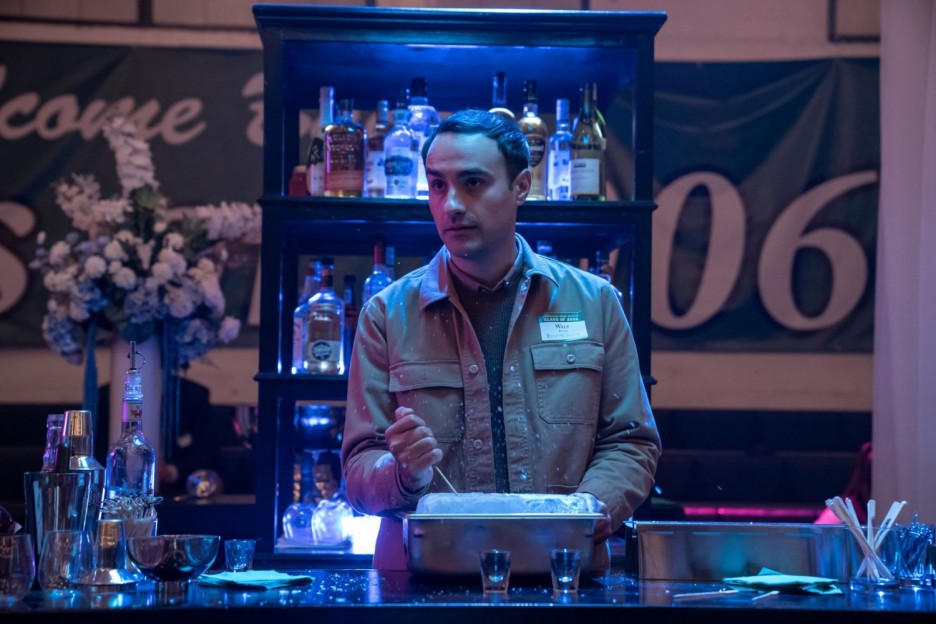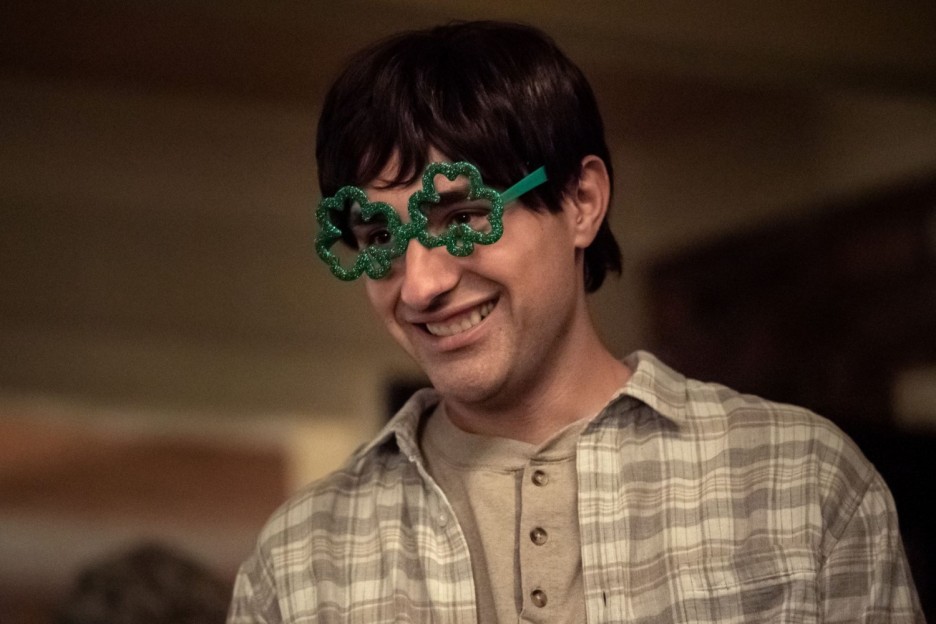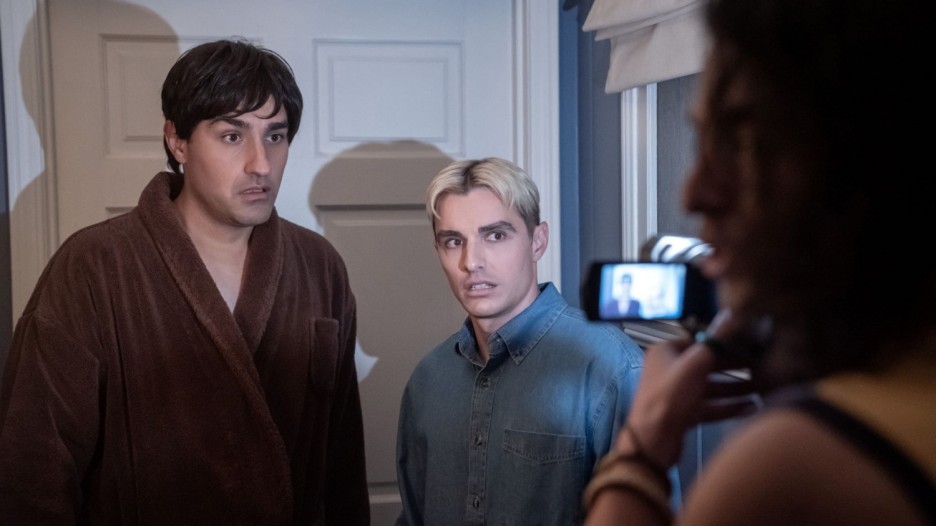HOT TAKE: Today's Episode of 'The After Party' Proves Walt is the ONLY Reliable Narrator On The Show! Invisibility Is A Blessing And A Curse!

Walt's story isn't even Walt's story.
If you've been keeping up with the excellent new Apple TV+ murder-comedy series The After Party, you then you've likely been wondering about Walt for a while.
Walt, played by Jamie Demitriou, is the invisible one. The one that has always been around but, somehow, no one seems to remember from high school. (Which, yes, using logic does make him a prime suspect in a murder show such as this one, but that's not what we are talking about yet.)
Today, Walt's episode aired, and here's the thing: it's still not about Walt.
The episode doesn't tell the story of Walt. Heck! The episode isn't even titled Walt. It's titled High School. It tells the story of the consistently mentioned St. Patrick's Day high school party that everyone attended. It is a night that gave every character motive to be where they find themselves now: a suspect in a murder.
Walt was able to tell this story because of his invisibility. His lack of true involvement in any one story line makes him the only unbiased narrator of the event. He is the equivalent of an outside observer without actually being on the outside. His invisibility cloaks him in a coat of armor that no one else on the show has: Walt is the only reliable character.
As he is not remembered by anyone else on the show, he is able to float by, observing everything without causing an impact within the confines of any given story like. Walt's episode accentuates the true plight of the invisible character, proving conclusively that invisibility is both a super power and a curse.

The idea that the invisible person is the most reliable is not a new concept; The After Party, through its intelligently established format, just points a laser focus on the power of such a character. It is more often than not the invisible outsider that has the most accurate information about the world. For example [GOSSIP GIRL SPOILER ALERT] It is the ever invisible Dan Humphrey who turns out to be the person commenting on everything going on, dissecting and manipulating the world of the upper east side from his invisible, external vantage point.
Similarly, in the iconic early 2000s revenge rom-com John Tucker Must Die (somehow also featuring Penn Badgley), Kate, played by Brittany Snow, is the one who reveals to the other three girls that they are being cheated on. She is the only one that sees clearly that they should not be getting mad at each other. They should be getting mad at him. Through their useful invisibility, the virtually unseen character is equipped with the ability to provide other people with a guidance and clarity that cannot be attained by people who find themselves entirely within the throws of the moment.
One of the most prominent aspects of Walt's character that is focused on consistently throughout the episode is that no one recognizes or listens to him. As we discover in the episode, the St. Patrick's Day party was actually at his house. He is constantly saying hello, trying to connect with people. Regardless of what he says, no one ever listens. This idea, of the person who knows everything not being listened to long predates Hollywood. It falls in-step with Cassandra of Greek Mythology.
Cassandra was gifted with the power of seeing the future. She was, however, cursed with the knowledge that no one would believe her even when she told them exactly what was happening. Such is the fate that has befallen Walt. He has known a truth that could have saved everyone a lot of trouble and heartbreak throughout their lives after this St. Patrick's Day party.

Yet, since no one would listen to him, or even heard him when he spoke, everyone's lot in life fell a little differently than it would have were all of the cards on the table: Aniq didn't go to Stamford, Zoe got together with Brett, everyone thought Chelsea had a three way, Ned and Jennifer eventually got married. The invisible character is consistently one of the world's most powerful, but is more often than not, ignored, even when they fully know what is correct.
Unlike Cassandra, Walt is able to burst through the cage of invisibility for a moment. Everyone listens intently when he tells his story because it has to do with everyone's favorite topic: themselves. However, as soon as the story is over, the attention moves away. As per his full invisibility, people, when a spotlight is shown on Walt, are only able to see within him their own part of the story. They see through the person continuously to get to their own personal reflection. As soon as their truth has been revealed, they see that there is no more of themselves in Walt, and they continue on with their own lives.
That is the eternal struggle of the invisible character. No matter how hard they try, they remain invisible. There have been some characters who break through this mold, but it only happens when they first hand involve themselves in the drama. For example, Kate in John Tucker Must Die stops being invisible when the others use her to get their revenge on their collective ex. Even in that, however, she starts as a mere reflection and tool for the other characters to use. When she develops her own feelings and situational opinions, operating as her own entity within the drama, does she become a visible character that people notice.
Similarly, Dan Humphry from Gossip Girl is entirely invisible until he, through his platform, writes himself into the societal throws of Upper East Side society. One of the most iconic and descriptive quotes from the series is, "You're no one until your talked about." In Gossip Girl, Dan skates by, under the radar, uninvolved in the world. It is only when everyone hates him and he gets punched in the face by his male best friend that he becomes a true part of their world.

Walt is facing this exact same conflict. He is not legitimately involved in any of the current drama. He is just an observer of it all. Therefore, he can talk about others, but no one can talk about him. Walt even planned the St. Patrick's Day party, but he did not do anything interpersonally crazy at the event and, therefore, remains untalked of and unseen.
Could that in and of itself be enough motive or reason for Walt to be the chief suspect of The After Party? Could he, ultimately, be the murderer for the sole reason of wanting to be an active, visible participant in the story rather than just an invisible viewer. Maybe Walt got tired of watching everyone else's movie. Maybe he wanted to star in his own.
Invisibility is a blessing and a curse. This most recent episode of The After Party shines a light on this otherwise literally not visible character, inspiring us to listen a little more closely when they talk and (maybe) changing what level of suspect they would be if there were to be a murder invovled (hypothetically).
Check out the next episode of The After Party on Apple TV+ on February 18th.
© 2026 Enstarz.com All rights reserved. Do not reproduce without permission.






